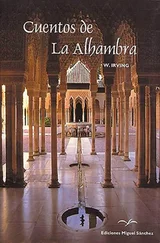As our proposed route to Granada lay through mountainous regions, where the roads are little better than mule paths, and said to be frequently beset by robbers, we took due travelling precautions. Forwarding the most valuable part of our luggage a day or two in advance by the arrieros, we retained merely clothing and necessaries for the journey and money for the expenses of the road, with a little surplus of hard dollars by way of robber purse, to satisfy the gentlemen of the road should we be assailed. Unlucky is the too wary traveller who, having grudged this precaution, falls into their clutches empty handed: they are apt to give him a sound ribroasting for cheating them out of their dues. “Caballeros like them cannot afford to scour the roads and risk the gallows for nothing.”
A couple of stout steeds were provided for our own mounting, and a third for our scanty luggage and the conveyance of a sturdy Biscayan lad, about twenty years of age, who was to be our guide, our groom, our valet, and at all times our guard. For the latter office he was provided with a formidable trabuco or carbine, with which he promised to defend us against rateros or solitary footpads; but as to powerful bands, like that of the “sons of Ecija,” he confessed they were quite beyond his prowess. He made much vainglorious boast about his weapon at the outset of the journey, though, to the discredit of his generalship, it was suffered to hang unloaded behind his saddle.
According to our stipulations, the man from whom we hired the horses was to be at the expense of their feed and stabling on the journey, as well as of the maintenance of our Biscayan squire, who of course was provided with funds for the purpose; we took care, however, to give the latter a private hint, that, though we made a close bargain with his master, it was all in his favor, as, if he proved a good man and true, both he and the horses should live at our cost, and the money provided for their maintenance remain in his pocket. This unexpected largess, with the occasional present of a cigar, won his heart completely. He was, in truth, a faithful, cheery, kindhearted creature, as full of saws and proverbs as that miracle of squires, the renowned Sancho himself, whose name, by the by, we bestowed upon him, and like a true Spaniard, though treated by us with companionable familiarity, he never for a moment, in his utmost hilarity, overstepped the bounds of respectful decorum.
Such were our minor preparations for the journey, but above all we laid in an ample stock of good humor, and a genuine disposition to be pleased, determining to travel in true contrabandista style, taking things as we found them, rough or smooth, and mingling with all classes and conditions in a kind of vagabond companionship. It is the true way to travel in Spain. With such disposition and determination, what a country is it for a traveller, where the most miserable inn is as full of adventure as an enchanted castle, and every meal is in itself an achievement! Let others repine at the lack of turnpike roads and sumptuous hotels, and all the elaborate comforts of a country cultivated and civilized into tameness and commonplace; but give me the rude mountain scramble; the roving, haphazard, wayfaring; the half wild, yet frank and hospitable manners, which impart such a true game flavor to dear old romantic Spain!
Thus equipped and attended, we cantered out of “Fair Seville city” at half-past six in the morning of a bright May day, in company with a lady and gentleman of our acquaintance, who rode a few miles with us, in the Spanish mode of taking leave. Our route lay through old Alcala de Guadaira (Alcala on the river Aira), the benefactress of Seville, that supplies it with bread and water. Here live the bakers who furnish Seville with that delicious bread for which it is renowned; here are fabricated those roscas well known by the well-merited appellation of pan de Dios (bread of God), with which, by the way, we ordered our man, Sancho, to stock his alforjas for the journey. Well has this beneficent little city been denominated the “Oven of Seville”; well has it been called Alcala de los Panaderos (Alcala of the bakers), for a great part of its inhabitants are of that handicraft, and the highway hence to Seville is constantly traversed by lines of mules and donkeys laden with great panniers of loaves and roscas.
I have said Alcala supplies Seville with water. Here are great tanks or reservoirs, of Roman and Moorish construction, whence water is conveyed to Seville by noble aqueducts. The springs of Alcala are almost as much vaunted as its ovens; and to the lightness, sweetness, and purity of its water is attributed in some measure the delicacy of its bread.
Here we halted for a time, at the ruins of the old Moorish castle, a favorite resort for picnic parties from Seville, where we had passed many a pleasant hour. The walls are of great extent, pierced with loopholes; inclosing a huge square tower or keep, with the remains of masmoras, or subterranean granaries. The Guadaira winds its stream round the hill, at the foot of these ruins, whimpering among reeds, rushes, and pond-lilies, and overhung with rhododendron, eglantine, yellow myrtle, and a profusion of wild flowers and aromatic shrubs; while along its banks are groves of oranges, citrons, and pomegranates, among which we heard the early note of the nightingale.
A picturesque bridge was thrown across the little river, at one end of which was the ancient Moorish mill of the castle, defended by a tower of yellow stone; a fisherman’s net hung against the wall to dry, and hard by in the river was his boat; a group of peasant women in bright-colored dresses, crossing the arched bridge, were reflected in the placid stream. Altogether it was an admirable scene for a landscape painter.
The old Moorish mills, so often found on secluded streams, are characteristic objects in Spanish landscape, and suggestive of the perilous times of old. They are of stone, and often in the form of towers with loopholes and battlements, capable of defence in those warlike days when the country on both sides of the border was subject to sudden inroad and hasty ravage, and when men had to labor with their weapons at hand, and some place of temporary refuge.
Our next halting place was at Gandul, where were the remains of another Moorish castle, with its ruined tower, a nestling place for storks, and commanding a view over a vast campina or fertile plain, with the mountains of Ronda in the distance. These castles were strongholds to protect the plains from the talas or forays to which they were subject, when the fields of corn would be laid waste, the flocks and herds swept from the vast pastures, and, together with captive peasantry, hurried off in long cavalgadas across the borders.
At Gandul we found a tolerable posada; the good folks could not tell us what time of day it was — the clock only struck once in the day, two hours after noon; until that time it was guesswork. We guessed it was full time to eat; so, alighting, we ordered a repast. While that was in preparation we visited the palace once the residence of the Marquis of Gandul. All was gone to decay; there were but two or three rooms habitable, and very poorly furnished. Yet here were the remains of grandeur: a terrace, where fair dames and gentle cavaliers may once have walked; a fishpond and ruined garden, with grapevines and date-bearing palm-trees. Here we were joined by a fat curate, who gathered a bouquet of roses and presented it, very gallantly, to the lady who accompanied us.
Below the palace was the mill, with orange-trees and aloes in front, and a pretty stream of pure water. We took a seat in the shade, and the millers, all leaving their work, sat down and smoked with us; for the Andalusians are always ready for a gossip. They were waiting for the regular visit of the barber, who came once a week to put all their chins in order. He arrived shortly afterwards: a lad of seventeen, mounted on a donkey, eager to display his new alforjas or saddlebags, just bought at a fair; price one dollar, to be paid on St. John’s day (in June), by which time he trusted to have mown beards enough to put him in funds.
Читать дальше












